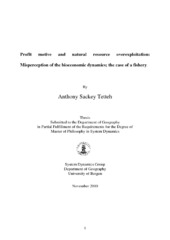| dc.description.abstract | Over-exploitation of fishery resources has become a major concern not only to users of the resource but society as a whole. Management of the resource has not yielded the desired result of sustainability despite huge efforts in this area. One reason for this deficiency is what Moxnes (1998) refers to as the misperceptions of resource dynamics which accounts for policy resistance in the fishery. Since the dynamics in the resource are not thoroughly understood, the policies arrived at end up not achieving the intended results and in some cases worsen the situation. Just like the management failure of Canada's ground fish resources, well intended actions in Ghana's fishery might have resulted in the problem of declining catches. In the 1970s fish traders stepped in to provide the financial needs of the fishers. Fishers paid back such loans by supplying the traders with fish. The paper investigates how this trade relation between fishermen and fish traders might have contributed to the problem of declining catches. Existing literature and simple models will be used to provide an insight into the dynamics of the resource and help to analyse how the two main causes of the catch decline, bottom trawling and trade relation might have impacted the resource. This will contribute to the education of fisheries managers and fishers about the resource which will help to manage the resource in a better way. The study adopts the system dynamics methodology of modelling to study the problem of declining catches and suggest policies to solve the problem. The findings are that bottom trawling by the industrial fleet should be halted to help provide safe breeding grounds for fish. Secondly mesh size regulations should be implemented in the artisanal fishery to make gears more selective. To make implementation of these policies effective, stakeholders should be involved in the management process. Keywords: fishery, misperception, dynamics, policy resistance, precautionary principle, co-management, stakeholders. | en_US |
